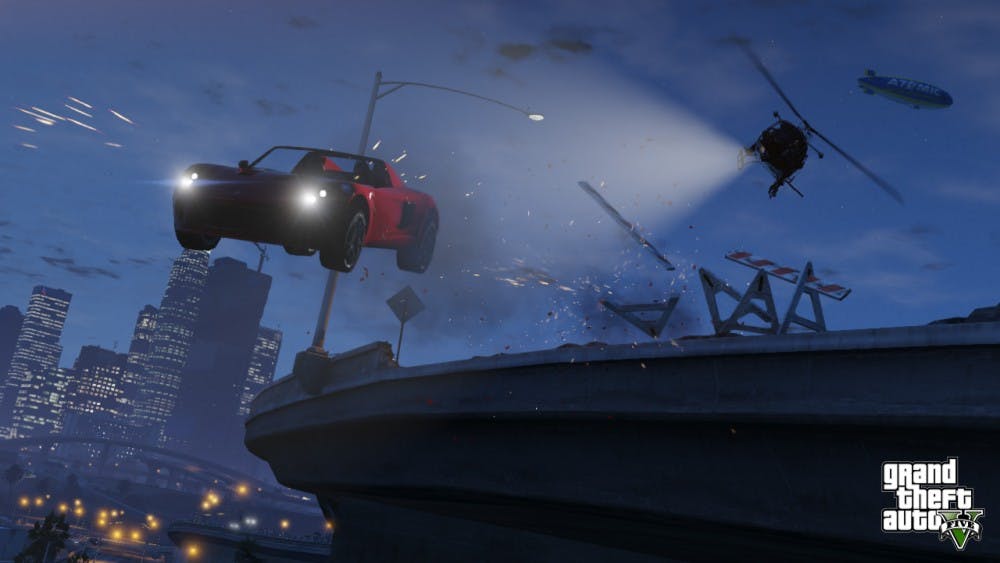Fifth game in series adds more excitement, crime.
From NYC analogue “Liberty City” to “Red Dead Redemption’s” early 20th century Southwest, no one manages to craft video game settings with quite the level of mastery that Rockstar Games does.
“Grand Theft Auto V’s” pseudo-Los Angeles is no exception. With an absolutely gorgeous urban sprawl coupled with miles and miles of open countryside, it is truly a sight to behold. Everything from the rolling ocean waves to the warm pastel sunsets and the near-perfect score by Tangerine Dream screams “California.”
Los Santos is absolutely the most ambitious, lively and breathtaking open world ever created.
Unlike prior games in the series, “GTA V” features three playable protagonists and their criminal escapades in and around the city of Los Santos. Each one represents a different part of the “GTA” identity. There’s Franklin, the gangster most in line with the rags-to-riches narratives of “GTA III” or “Vice City.”
There’s Michael, a retired bank robber who made it out of his business alive and wealthy, but is now struggling with his retired life with his family in the suburbs. He represents the newer “GTA” protagonists, such as “GTA IV’s” Niko Bellic, as he searches for happiness in a world of excess and corruption.
The next character, Trevor, is a murderous hillbilly combination of Jack Nicholson and The Joker and is the psychotic embodiment of the chaotic tendencies of “GTA” players themselves.
Players can switch between each of these sociopaths at a moment’s notice when not on a mission. It’s a clever system, one which helps improve the oftentimes sluggish pace of “GTA” considerably. It also leads to some great shock humor, such as swapping to Trevor only to find him passed out on a beach, wearing nothing more than his shoes and underwear, surrounded by corpse and clutching a beer in one hand.
The swapping system really clicks when the characters all meet up for a mission together. Being able to hot swap between sniping one second and in close quarters combat the next is inherently exciting and mixes up the flow of the otherwise simplistic lock-on-and-shoot gunplay.
Oftentimes when Michael, Franklin and Trevor meet up, it is to stage one of the game’s big heist missions. Each heist has two entirely different approaches which the player can chose from. One usually involves using the tried and true method of going in, guns blazing and the other is typically an “Ocean’s Eleven” style ripoff, involving getting in and out with limited to no witnesses. These missions are the highlights of “GTA V;” they are so interesting and fun to execute that they likely could have supported a whole game on their own.
The only downside is that there are only six heists throughout the game, despite there being enough ideas in place for at least twice as many.
Where “GTA IV” was an open world game focused on the story it wanted to tell, oftentimes to the detriment of satisfying gameplay, “GTA V” is in many ways the polar opposite. Though the characters are some of the strongest Rockstar has written, the payoff for their criminal ventures is a narrative which is bloated, messy and weirdly incomplete. Many character arcs taper off before they really resolve, leading to a conclusion that ties everything together about as neatly as a Christmas present wrapped in duct tape.
However, when appreciated as a game, “GTA V” is a dramatic improvement over its predecessors. The shooting and driving controls are tighter and unlike “GTA IV,” little time is wasted on petty early game missions. “GTA V” kicks off with Franklin stealing a high end sports car and things only ramp up from there. Hijacking a cargo plane, robbing a train and setting fire to a meth lab are just a few of the numerous set pieces in the story, and there’s very little fat between them.
Systems, graphics and jewelry store heists aside, what makes “GTA V” so special is the indescribable level of detail in every conceivable aspect of it. The mishandled narrative and juvenile cultural satire are upsetting, but feel less problematic when you take into account that feeling of playing a game so unprecedented in scope that it still manages to surprise, even two dozen hours in.
There’s a line of dialogue for every possibility in “GTA V,” and a physics engine interaction for every occurrence. As expensive and predictable as AAA games have gotten over this generation, “GTA V” closes it out by reminding us that games can, at least for a few brilliant moments, still be bigger and deeper than our comprehension of them and it reminds players that computer code can still be magic.

